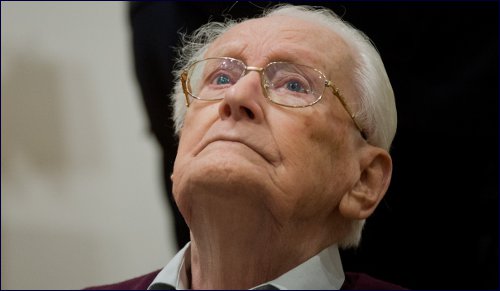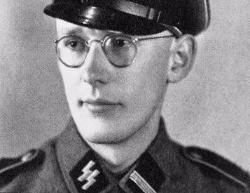 An Open Letter to University Presidents
An Open Letter to University Presidents


4 min read
11 min read
4 min read
5 min read
Justice is not being served.
Seven decades after the Holocaust, in a small courthouse in Luneburg Germany, a trial that is probably the last of its kind is making headlines around the world.
Oskar Groening is being tried on 300,000 counts of accessory to murder, related to a period between May and July 1944 when around 425,000 Jews from Hungary were brought to the Auschwitz-Birkenau complex in Nazi-occupied Poland and almost immediately gassed to death. Groening, known as “the accountant of Auschwitz”, faithfully fulfilled his duty as SS-Unterscharführer, collecting the cash that doomed Hungarian Jews carried with them to the place of their extermination and seeing to its shipment to Berlin to give financial backing to the final solution of genocide. For his role, this now 93-year-old faces 6 to 15 years if convicted.
I must make a painful confession. Much as I rejoiced at the capture of Eichmann and his execution in Israel and much as I found a great measure of satisfaction in the past by verdicts of guilt and punishment – admittedly all too few – for those involved in the barbaric crimes of the Holocaust, I am troubled by the rationales now being stressed for the importance of this particular trial.
Does it make any sense to be told that we need again to hear the testimony of witnesses as well as the admission of the defendant in order to refute the claims of Holocaust deniers? To continue an argument with those who refuse to accept historic fact is to grant an undeserved measure of truth to an absurdity, as if it were worthy of debate and further discussion. Deniers are no better than spokesman for the Flat Earth Society who deserve only laughter, not a public hearing which grants them legitimacy as worthy intellectual opponents.
 Yes, Oskar Groening publicly admitted, "I saw everything. The gas chambers, the cremations, the selection process. One and a half million Jews were murdered in Auschwitz. I was there." But we did not really need him to tell us that. Indeed, Ursula Haverbeck, one of Germany’s more infamous Holocaust deniers, was in court for Groening’s initial testimony and after listening to his detailed description of what happened in the camp, not unexpectedly commented, “He’s been turned.”
Yes, Oskar Groening publicly admitted, "I saw everything. The gas chambers, the cremations, the selection process. One and a half million Jews were murdered in Auschwitz. I was there." But we did not really need him to tell us that. Indeed, Ursula Haverbeck, one of Germany’s more infamous Holocaust deniers, was in court for Groening’s initial testimony and after listening to his detailed description of what happened in the camp, not unexpectedly commented, “He’s been turned.”
For those interested in truth, the facts have long ago been established; for those motivated by irrational hatred of Jews and of Israel, no amount of irrefutable proof will suffice to open the closed minds of haters.
To be gratified by Groening’s confessions to the horrors that took place at Auschwitz is almost as if one were previously unsure of the truth previously documented by hundreds of survivors and eyewitnesses.
But there is another and more important reason being trumpeted as cause for rejoicing for this long-delayed trial. At last, we are told, we can feel that justice is finally being done in the country responsible for one of the most unspeakable crimes of history. It will serve, it’s been suggested in several articles, as a fitting closure to the Nazi sins of the twentieth century.
6500 members of the SS worked at Auschwitz. To date only 49 have been convicted of crimes.
And that is precisely why I feel so devastated by this implicit insult to the memory of the six million.
The Groening trial is being showcased as vivid demonstration of Germany’s concern for bringing the guilty to punishment. Yet what it proves sends precisely the opposite message.
The year is now 2015. The legal action against Groening somehow never found its way to the court for countless decades. All the while, records indicate that about 6500 members of the SS worked at Auschwitz – and that was merely one of the many factories of death which carried out the fiendish designs of the final solution. Of those, to date only 49 have been convicted of crimes.
Remarkable, too, is the nature of the crimes attributed to Groening in comparison to those who somehow have escaped judicial notice, having lived out their lives in serenity and in all probability blessed prosperity. Groening pleads that he was not actively involved in the murders, the beatings, the gassing and the tortures of Auschwitz. He admits that he shares in the moral guilt but feels that does not make him culpable under law. True, by all accounts, even his own reflections on his past, he is not an innocent.
But should we not ask what happened to all the others who somehow escaped the scrutiny of the courts, the inquiries of the authorities, the investigations of the legal system charged with bringing to justice not simply those who bureaucratically assisted the machinery of evil but who brutally carried out its heinous cruelties?
Is it not a travesty of the very word justice if the most that German courts can succeed in accomplishing after these many years of indifferent pursuit of the truly guilty is to convict a 93-year-old concentration camp accountant while the many tens of thousands of sadistic beasts who carried out the horrific acts which defined Nazi cruelty and inhumaneness never paid a price for their sins?
And if Groening is found guilty and sentenced, while all those who actually carried out the crimes of the death camps escaped judicial notice, would not the greatest tragedy of all be for the world to offer its final judgment on the Holocaust with the false pronouncement that in the end justice was served?
